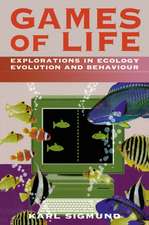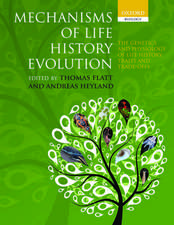Quantitative Ecology and Evolutionary Biology: Integrating models with data: Oxford Series in Ecology and Evolution
Autor Otso Ovaskainen, Henrik Johan de Knegt, Maria del Mar Delgadoen Limba Engleză Paperback – 12 mai 2016
| Toate formatele și edițiile | Preț | Express |
|---|---|---|
| Paperback (1) | 353.15 lei 31-38 zile | |
| OUP OXFORD – 12 mai 2016 | 353.15 lei 31-38 zile | |
| Hardback (1) | 703.10 lei 10-17 zile | |
| OUP OXFORD – 12 mai 2016 | 703.10 lei 10-17 zile |
Din seria Oxford Series in Ecology and Evolution
-
 Preț: 321.54 lei
Preț: 321.54 lei - 25%
 Preț: 502.27 lei
Preț: 502.27 lei -
 Preț: 325.98 lei
Preț: 325.98 lei - 18%
 Preț: 459.19 lei
Preț: 459.19 lei - 27%
 Preț: 377.45 lei
Preț: 377.45 lei - 19%
 Preț: 439.25 lei
Preț: 439.25 lei - 13%
 Preț: 443.22 lei
Preț: 443.22 lei - 28%
 Preț: 376.06 lei
Preț: 376.06 lei - 34%
 Preț: 697.21 lei
Preț: 697.21 lei - 9%
 Preț: 296.35 lei
Preț: 296.35 lei - 14%
 Preț: 480.86 lei
Preț: 480.86 lei - 12%
 Preț: 424.74 lei
Preț: 424.74 lei - 18%
 Preț: 356.03 lei
Preț: 356.03 lei - 13%
 Preț: 443.36 lei
Preț: 443.36 lei - 13%
 Preț: 464.12 lei
Preț: 464.12 lei - 27%
 Preț: 377.84 lei
Preț: 377.84 lei - 41%
 Preț: 139.55 lei
Preț: 139.55 lei - 30%
 Preț: 718.17 lei
Preț: 718.17 lei - 38%
 Preț: 268.41 lei
Preț: 268.41 lei - 30%
 Preț: 590.27 lei
Preț: 590.27 lei - 30%
 Preț: 497.74 lei
Preț: 497.74 lei - 19%
 Preț: 352.15 lei
Preț: 352.15 lei - 18%
 Preț: 360.28 lei
Preț: 360.28 lei - 28%
 Preț: 375.06 lei
Preț: 375.06 lei - 28%
 Preț: 375.73 lei
Preț: 375.73 lei - 34%
 Preț: 802.62 lei
Preț: 802.62 lei - 19%
 Preț: 351.62 lei
Preț: 351.62 lei - 14%
 Preț: 437.87 lei
Preț: 437.87 lei - 30%
 Preț: 550.67 lei
Preț: 550.67 lei - 22%
 Preț: 400.41 lei
Preț: 400.41 lei - 19%
 Preț: 352.29 lei
Preț: 352.29 lei - 18%
 Preț: 354.05 lei
Preț: 354.05 lei - 28%
 Preț: 372.74 lei
Preț: 372.74 lei - 28%
 Preț: 495.10 lei
Preț: 495.10 lei - 8%
 Preț: 299.19 lei
Preț: 299.19 lei - 23%
 Preț: 464.29 lei
Preț: 464.29 lei - 28%
 Preț: 375.06 lei
Preț: 375.06 lei - 30%
 Preț: 592.43 lei
Preț: 592.43 lei
Preț: 353.15 lei
Preț vechi: 410.18 lei
-14% Nou
Puncte Express: 530
Preț estimativ în valută:
67.57€ • 70.55$ • 55.93£
67.57€ • 70.55$ • 55.93£
Carte tipărită la comandă
Livrare economică 24-31 martie
Preluare comenzi: 021 569.72.76
Specificații
ISBN-13: 9780198714873
ISBN-10: 0198714874
Pagini: 304
Dimensiuni: 166 x 233 x 15 mm
Greutate: 0.52 kg
Editura: OUP OXFORD
Colecția OUP Oxford
Seria Oxford Series in Ecology and Evolution
Locul publicării:Oxford, United Kingdom
ISBN-10: 0198714874
Pagini: 304
Dimensiuni: 166 x 233 x 15 mm
Greutate: 0.52 kg
Editura: OUP OXFORD
Colecția OUP Oxford
Seria Oxford Series in Ecology and Evolution
Locul publicării:Oxford, United Kingdom
Recenzii
The book is a highly fascinating read for ecologists and evolutionary biologists interested in learning more about modelling approaches.It mightlikewise be interesting for mathematicians, statisticians and computer scientists interested in ecological and evolutionary questions.It is an advanced but essential text that surely stimulates further reading.
Notă biografică
Otso Ovaskainen obtained his PhD in mathematics in 1998 at the Helsinki University of Technology. To combine his mathematical training with his interest in ecology, he did his postdoctoral training with Professor Ilkka Hanski in Helsinki University and with Professor Bryan Grenfell in Cambridge University. He became a research fellow funded by the Academy of Finland in 2003, at which time he founded the Mathematical Biology Group, which is part of Ilkka Hanski's Metapopulation Research Centre. He became a professor in Helsinki University in 2009, and a visiting professor in Trondheim University in 2014. He is broadly interested in mathematical and statistical approaches in ecology and evolutionary biology.Henrik de Knegt obtained his PhD in ecology in 2010 at Wageningen University (the Netherlands), after which he moved to Finland as a postdoctoral researcher at the University of Helsinki. He is broadly interested in spatial ecology, especially the small-scale mechanisms behind the movement and habitat selection of organisms. This is because the movement process couples organisms to their spatial-temporal environment, and is vital to coupling individual-level behaviour to population-level dynamics. He recently moved back to the Netherlands where his work at Wageningen University aims at contributing to the prevention of rhino poaching, through the development of a response system that highlights where and when poaching is taking place, based on anomalies in animal movement patterns that might signal poaching-induced disturbances.Maria del Mar Delgado did her degree in Biology at the University of Seville (Spain), and then a PhD in ecology at Doñana Biological Station (CSIC, Spain). She then moved to Finland where she has spent her last seven years as a postdoctoral researcher. She is interested in a wide array of issues within behavioural and evolutionary ecology, biodiversity and conservation biology. The main goal of her scientific trajectory is to carry out multidisciplinary, synthetic ecological and evolutionary research with a strong collaborative basis. Ecology and evolution are essentially trans-disciplinary areas, and thus she has always been interested in combining experimental, theoretical, and observational approaches. The main focus of her research is on gaining an integrated understanding of the structure and dynamics of natural populations and communities by combining rigorous statistical analyses with long-term monitoring data.








